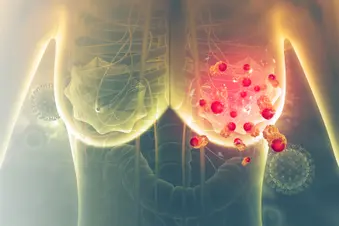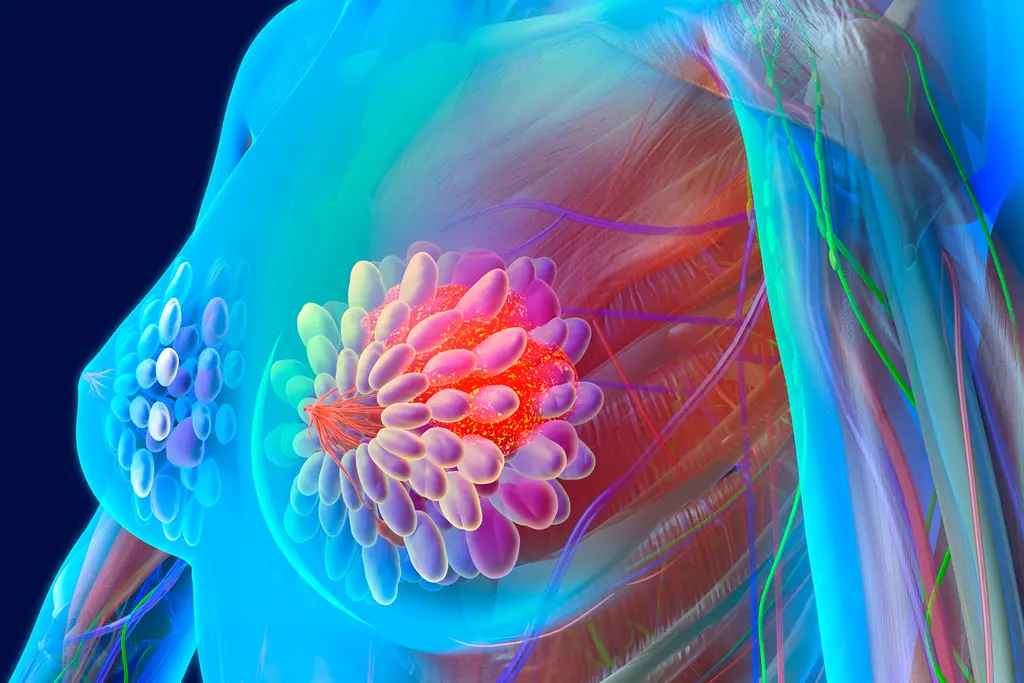
HER2 is a protein that’s on the outside of all breast cells, whether they’re normal or cancerous. But when your breast cancer is described as HER2-positive, it means the cancer cells have more HER2 protein than usual.
Since this protein can make cancer cells grow more quickly, it’s natural to worry that your HER2-positive breast cancer might spread, or “metastasize.” If breast cancer spreads to other parts of your body, doctors call it “metastatic.” That means it’s at a more advanced stage than if it’s only in your breasts.
Why Breast Cancer Can Spread
Any type of breast cancer can spread. This happens when cancer cells get into healthy cells around the breast. If they spread, cancer cells usually go to other parts of the breast first. Lymph nodes near the breast tend to be the next place cancer cells go. From there, cancer cells can travel to other parts of the body farther from the breast.
About one in every five breast cancers are HER2-positive. This means they have extra copies of a gene that makes the HER2 protein. HER2-positive breast cancer can grow and spread faster than other breast cancers because HER2 protein speeds that growth.
Whether breast cancer spreads also depends on several other things. These include:
- If your tumor is HER2-positive or a different type
- The stage your cancer was when you were first diagnosed
- The size of the tumor
- Whether cancer was also found in nearby lymph nodes
On the positive side, treatments that aim right at the HER2 protein can work very well. These targeted medications raise the odds that you can beat the disease back.
Where It Can Spread
Even when breast cancer spreads to another part of the body, it’s still considered breast cancer.
Breast cancer tends to spread to the:
- Liver
- Lungs
- Bones
- Brain
- Skin
Watch for These Signs
Signs that your breast cancer has spread may also depend on where it is. Here’s what to watch for if it has spread to your:
Liver:
- Belly pain
- Not feeling hungry
- Hiccups that keep coming back
- Fluid buildup in your belly, called ascites
- Yellow skin and/or whites of eyes (jaundice)
- Itching
- You just don’t feel well
Lungs:
- Shortness of breath
- Dry cough that doesn’t go away
- Trouble breathing
- Chest pain or tightness that stays
Bones:
- Bone, back, neck, or joint pain, which can feel worse when you lie down
- Bones break more easily
- Swelling
Brain:
- Headaches
- Dizziness
- Feeling sick to your stomach
- Throwing up
- Weakness
- Numbness on one side of your body
- Loss of balance
- Seizures
- Trouble speaking or seeing
- Memory problems
- Mood or personality changes
- Confusion
Skin:
- Change in skin color
- Rash that won’t go away
- Swelling in the arm, hand, or breast area
- Bleeding
- Strange smell coming from your body
- Infection
- Pain
Tests to Detect Spread
If you notice signs that your HER2-positive breast cancer may have spread, talk to your doctor. This is especially important if your symptoms are new, won’t go away, or you can’t tell why they may be happening.
But it’s important not to panic. Keep in mind that symptoms such as bone pain can happen from arthritis, getting older, or even from your breast cancer treatment. Meanwhile, a cough and shortness of breath could just mean you have a cold or the flu. And it’s normal to feel tired and to not be hungry after you’ve had cancer treatment.
To figure out if your breast cancer has spread, your doctor might do a variety of tests. These can include:
- Blood tests, some of which may look for tumor “markers”
- Bone scan
- Imaging tests to see inside your body, including MRI, CT, or PET scans
- X-rays
- Ultrasound
- Biopsy, which takes a sample of cells from a suspicious area
- Bronchoscopy, which inserts a tube to look inside your airways
- Removal of fluid from around the area that shows symptoms
If HER2-positive breast cancer does spread, cells from the new area in which it’s growing should be retested for HER2 protein, since cell types can sometimes change after cancer is first diagnosed.
Show Sources
Photo Credits:
Header Image: Mohammed Haneefa Nizamudeen / Getty Images
Inset: Hank Grebe / Getty Images
SOURCES:
American Cancer Society: “Breast Cancer HER2 Status.”
Breast Cancer Now: “Secondary Breast Cancer Symptoms.”
Moffitt Cancer Center: “Where Does Breast Cancer Metastasize To?”
American Society of Clinical Oncology: “Breast Cancer -- Metastatic: Introduction,”
“Risk Factors,” “Symptoms and Signs.”
Breastcancer.org: “Metastatic Breast Cancer Symptoms and Diagnosis.”
Mayo Clinic: “HER2-Positive Breast Cancer: What Is It?”
